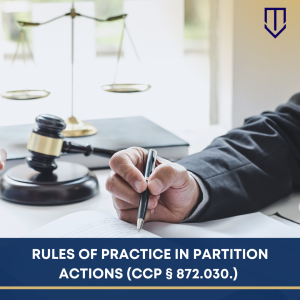 The California Code of Civil Procedure plays a pivotal role in shaping the legal landscape of civil actions. The California Partition Law starts at section 872.010 and ends at section 874.323. Among the partition provisions, section 872.030 highlights the importance of consistency in the application of laws in partition actions. Section 872.030 applies the general rules of civil actions to partition actions unless they are inconsistent with the partition statute. If the Partition Law differs from the general sections of the Code of Civil Procedure, the Partition Law trumps the other section because partition actions are tailored to the unique nature of partition disputes and often have specialized requirements.
The California Code of Civil Procedure plays a pivotal role in shaping the legal landscape of civil actions. The California Partition Law starts at section 872.010 and ends at section 874.323. Among the partition provisions, section 872.030 highlights the importance of consistency in the application of laws in partition actions. Section 872.030 applies the general rules of civil actions to partition actions unless they are inconsistent with the partition statute. If the Partition Law differs from the general sections of the Code of Civil Procedure, the Partition Law trumps the other section because partition actions are tailored to the unique nature of partition disputes and often have specialized requirements.
Code of Civil Procedure section 872.030 states:
The statutes and rules governing practice in civil actions generally apply to actions under this title except where they are inconsistent with the provisions of this title.
 California Partition Law Blog
California Partition Law Blog


 Yes. California law allows a co-owner to take out a mortgage without the other co-owners consent or knowledge.
Yes. California law allows a co-owner to take out a mortgage without the other co-owners consent or knowledge. 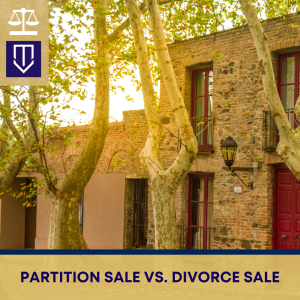 Partitions sales and divorce sales are two different ways that a property can be sold. One difference between the two is that in a partition sale, the court usually decides the proportion of ownership and how the proceeds are distributed among the owners, while in a divorce sale, the court generally must divide the property equally. Another difference is that the divorce sale process is similar to a normal real estate sale. Both sales can be determined informally among the parties or ordered by a court.
Partitions sales and divorce sales are two different ways that a property can be sold. One difference between the two is that in a partition sale, the court usually decides the proportion of ownership and how the proceeds are distributed among the owners, while in a divorce sale, the court generally must divide the property equally. Another difference is that the divorce sale process is similar to a normal real estate sale. Both sales can be determined informally among the parties or ordered by a court. 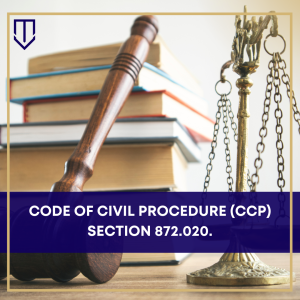 California Code of Civil Procedure section 872.020 is under Title 10.5 Partition of Real and Personal Property. This statute details the scope, or in other words, the
California Code of Civil Procedure section 872.020 is under Title 10.5 Partition of Real and Personal Property. This statute details the scope, or in other words, the  Partitions sales and trustee sales are two different ways that a property can be sold. A main difference between the two is that a partition sale is ordered and overseen by the court, while a trustee sale is overseen by a third party in relation to foreclosure proceedings. While the third party is not beholden to a court ruling in a trustee sale, they must still follow the procedures outlined in California law.
Partitions sales and trustee sales are two different ways that a property can be sold. A main difference between the two is that a partition sale is ordered and overseen by the court, while a trustee sale is overseen by a third party in relation to foreclosure proceedings. While the third party is not beholden to a court ruling in a trustee sale, they must still follow the procedures outlined in California law.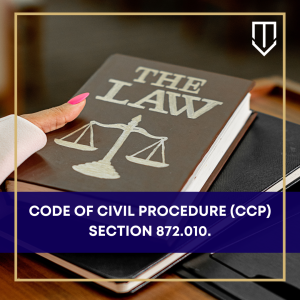 The
The 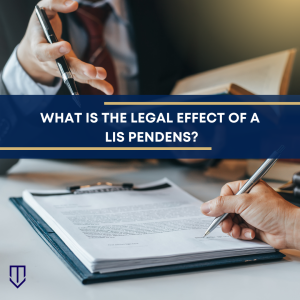 Lawsuits that affect interests in real property, such as partition actions, often require courts to adjudicate competing claims regarding who should have title to or possession of real property. In general, courts adjudicating such disputes follow the principle of “first in time, first in right.” Under this principle, “a conveyance recorded first generally has priority over any later-recorded conveyance.” (
Lawsuits that affect interests in real property, such as partition actions, often require courts to adjudicate competing claims regarding who should have title to or possession of real property. In general, courts adjudicating such disputes follow the principle of “first in time, first in right.” Under this principle, “a conveyance recorded first generally has priority over any later-recorded conveyance.” ( Generally, a co-owner of real property may commence an action in a partition. Owners of an estate of inheritance, a life estate, or an estate for years who hold such interest concurrently or in successive estates may seek to
Generally, a co-owner of real property may commence an action in a partition. Owners of an estate of inheritance, a life estate, or an estate for years who hold such interest concurrently or in successive estates may seek to 
 A deed is a legal instrument, evidenced in writing, to confirm the ownership interest or legal rights of an owner of real property. Essentially, a deed is necessary to determine the titleholder of a piece of real estate. Moreover, a deed grants an owner of real property legal rights to convey, sell, or transfer the property. Therefore, when purchasing a piece of real property, it is extremely important for a person to obtain a deed in order to evidence their ownership in writing and protect their legal rights in the property.
A deed is a legal instrument, evidenced in writing, to confirm the ownership interest or legal rights of an owner of real property. Essentially, a deed is necessary to determine the titleholder of a piece of real estate. Moreover, a deed grants an owner of real property legal rights to convey, sell, or transfer the property. Therefore, when purchasing a piece of real property, it is extremely important for a person to obtain a deed in order to evidence their ownership in writing and protect their legal rights in the property.